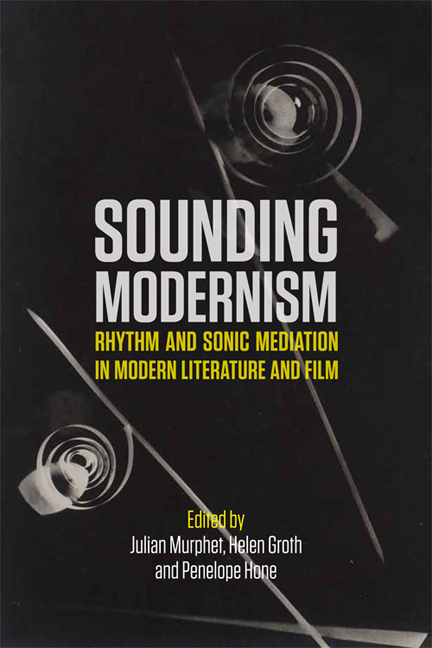Book contents
- Frontmatter
- Contents
- Acknowledgements
- 1 Introduction: Sounding Modernism 1890–1950
- Part One Writing Modern Sound
- 2 On Not Listening to Modernism
- 3 Advocating Auricularisation: Virginia Woolf's ‘In The Orchard’
- Part Two Mediated Voices
- Part Three Difficult Voices
- Part Four Modern Rhythm: Writing, Sound, Cinema
- Notes on Contributors
- Bibliography
- Index
2 - On Not Listening to Modernism
from Part One - Writing Modern Sound
Published online by Cambridge University Press: 22 December 2017
- Frontmatter
- Contents
- Acknowledgements
- 1 Introduction: Sounding Modernism 1890–1950
- Part One Writing Modern Sound
- 2 On Not Listening to Modernism
- 3 Advocating Auricularisation: Virginia Woolf's ‘In The Orchard’
- Part Two Mediated Voices
- Part Three Difficult Voices
- Part Four Modern Rhythm: Writing, Sound, Cinema
- Notes on Contributors
- Bibliography
- Index
Summary
At the heart of Robert Duncan's first great serial poem, The Opening of the Field (1960), is a fourfold lyric entitled ‘Four Pictures of the Real Universe’. The poem strives to make mythic sense of the heat death of the universe, ‘the death of stars’ and ‘emanations out of light perishing’. The second verse reads as follows:
THE WALL
Crowned Beast of Pure Thriving!
You pass thru the wall of thot,
thru the stone wall, thru the walls of the body
gathering all into your strength,
altering nothing.
From your roar, legions fly thru the universe
ringing the suns, sounding flames of immediate victory
that we see as white flowers
lost in the waves of morning green. (34)
The universe's procreant urge is configured as a Beast of sound, whose ‘roar’ is not unlike cosmic radiation penetrating every wall, making everything immanent to it, but which we cannot hear, only ‘see as white flowers’. The tune is taken up again in the final verse:
THE CLOSET
And does not the spirit attend secretly
the music that is hidden away from me,
chords that hold the stars in their courses,
outfoldings of sound from the seed of first light?
Were it not for the orders of music hidden
we should be claimd by the preponderant void. (35)
The Pythagorean music of the spheres persists, via Duncan's mythography, even into the age of the Big Bang, where the ‘cosmic hum’ of interstellar space was just then being taken as a sign of the infinite universe's singular origins. In 1947 George Gamow and Ralph Alpher had speculated that ‘the existence of galactic background radiation [was] a remnant of that initially stupendous detonation of what [he] called “ylem”, matter-in-readiness, and what Lemaître called “l'atome primitif” (these days, a “singularity”)’. But this speculated sound would not actually be heard, and then only by machines, until 1964, four years after Duncan's poem was published, ‘when Arno Penzias and Robert Wilson of Bell Labs in Holmdel confronted a faint, ineliminable noise in the “ultra-sensitive microwave receiving system” of their radio-telescope’, a dim ‘fossil whisper’ of creation, or ‘outfoldings of sound from the seed of first light’ (825).
- Type
- Chapter
- Information
- Sounding ModernismRhythm and Sonic Mediation in Modern Literature and Film, pp. 19 - 34Publisher: Edinburgh University PressPrint publication year: 2017



